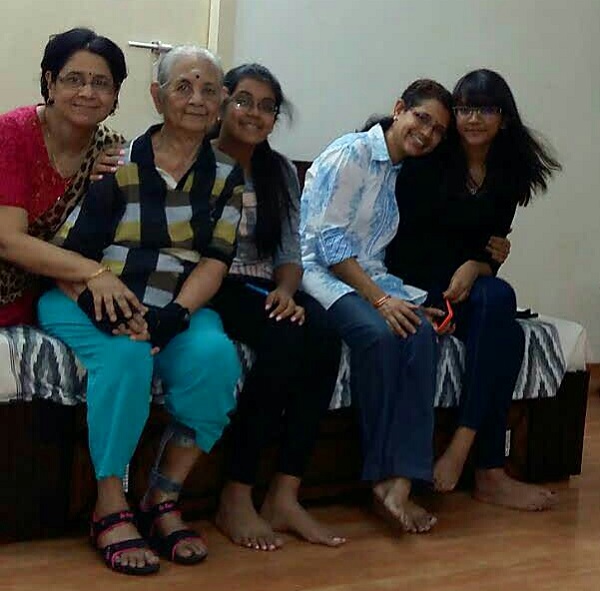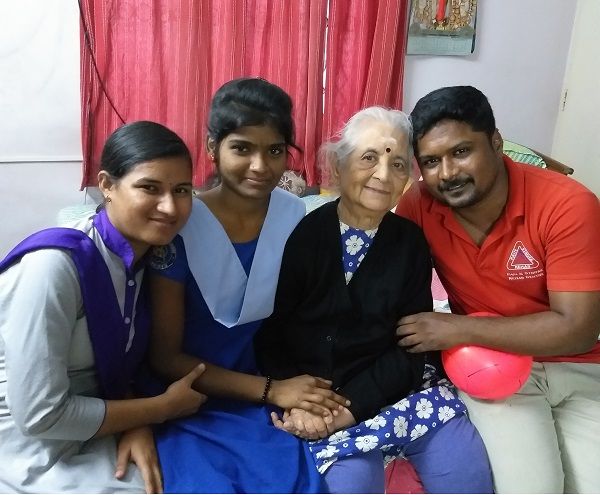
Ranjana Rajan had a difficult time when her mother Vaidehi suddenly got a stroke and returned home with her left limbs paralysed. Here, she narrates her experiences and challenges as a caregiver of a stroke patient and suggests some measures to reduce the burden.
April 6, 2014, 9 pm: While eating her dinner, my 80-year old mom’s eyes became blurry, her left jaw dropped and she fell to one side of the chair; we immediately called a nearby hospital emergency service and moved her there. Her BP on admission was 220/120. Cardiologist on duty normalised her BP while she was in the emergency room and then shifted her to CCU. He then said ‘your mom is having stroke’. Her MRI revealed 4cm bleed in her right brain (later, she told us that she heard big ‘thud’ in her head in the emergency room).
The key learning was that chances of survival are high if patient is admitted into the hospital within the first 20-30 minutes of stroke occurrence.
Stroke Rehabilitation
After 21 days at the hospital, my mother came home with partial paralysis of the left side. Much of the rehabilitation was initiated and planned by me, my husband and my sister. For this, we googled, spoke to our family physiotherapist and others and slowly learnt all that had to be done to help a stroke patient. Active physiotherapy was attempted in the ICU which had to be abandoned as she slipped out of the hands of the physiotherapist. Her current rehab plan includes active physiotherapy, 24x7 nursing care, O2 machine on standby, and 24x7 unconditional love and support from us. Rehabilitation without support from family may not have effective results.
Read: More Stroke Rehabilitation and Recovery Tips
Risks in Hospital
- When my mom was in hospital she suffered breathlessness. Only when I requested for the cardiologist to see my mom, he figured out, after some tests, that she had developed pulmonary embolism. So she was put on blood thinner tablet after a course of abdomen injections for which she was again reeled into ICU.
- Elderly patients usually develop UTI while in hospital.
Hospital’s role at the time of discharge
At the time of discharge, the hospital should be able to provide the family with a rehabilitation plan, options relating to engaging service providers (caregiver associations, physiotherapists (what type of physio exercises and props such as stick, ball etc) and support materials required and their suppliers (wheel chair, special bed/alpha-bed, bedpan, clothing, underpad, diaper, diet, etc)
Hospital acquired infection (HAI) is common, so hospitals should also alert the family of possible recurring UTIs and other problems. My mom came home with UTI and it recurred for over 2 years. Blood thinners shouldn’t be given without a regular blood test (in my mom case, too much blood thinner resulted in rectal bleed). We were given very little information when my mother was discharged. My life and that of my family, including my mom, has changed drastically – it’s like pre and post-stroke era. Initially, life for me and my husband was so difficult that even if my mother developed fever we would rush to her neurologist/cardiologist. We gradually learnt to figure out which of her complaint is a serious one and which can be tackled at home.

Doctor’s role
There are committed and “not-so-committed” doctors and we figured these out through trial and error. We are fortunate to have an excellent cardiologist (under whose care her BP has continued to be normal) and a neurologist (the one that hospital provided did not detect her pulmonary embolism, so we went to another neurologist who proved to be as good as the cardiologist). The neurologist stopped her anti-fits medication after brain scan 6 month post stroke. In her case blood thinners were not required after 6-month check-up.
Home Care Nurses
This continues to be sub-satisfactory. While the charges are exorbitant, service at times lacks either in ensuring hygiene or in understanding the emotional swings of patient. Family ends up substituting for what is lacking from the nursing agencies. Home care nurses while committed to work need a lot more skill development and training.

How My Family Rallied Around To Support
Caregiver Support Network
At one point, there were so many things I was dealing w.r.t to my mom’s recovery that I googled and found a caregiver association in Chennai (Care Cubed) whose head came home and that helped me a lot in terms of emotional balance. I also attended their meetings.
There is substantial financial and emotional burden (treatment plans are not for the faint-hearted) just to keep my mom at least feeling normal. It is important for the family to factor this in and plan.
What Caregivers of Stroke Survivors Need
We need caregiver associations in India that can engage with government for higher tax exemption under 80DD, lower or nil GST on elderly products; list of capable qualified home-visit doctors city wise who are committed to spend time with such patients and diagnose accurately. Specialist organisations providing “Assisted Living Services” are the need of the hour in India.






